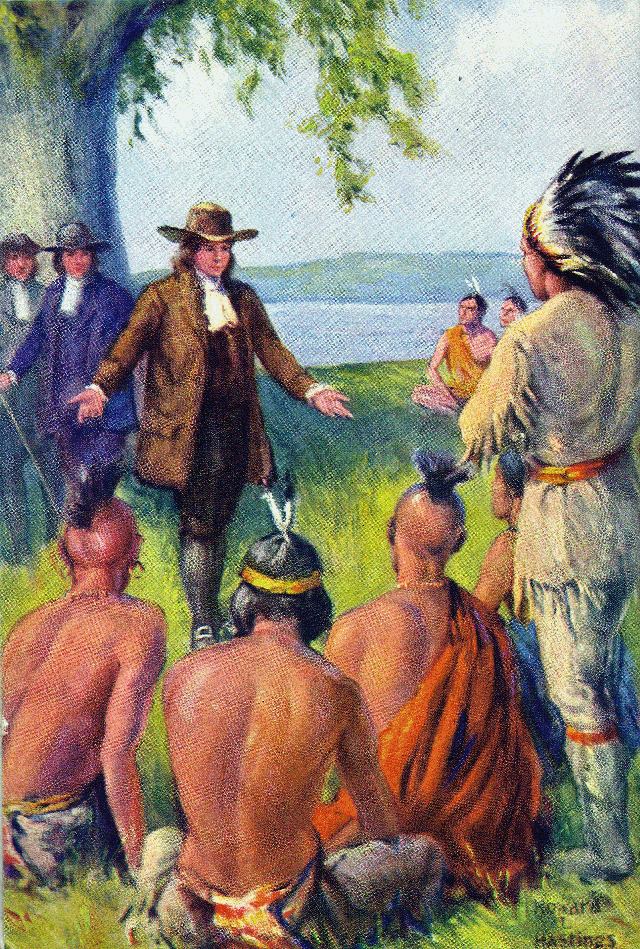
Their memory could not recall a time they did not live upon this land. Their villages dotted the shores of streams and rivers near the forest’s edge.
They called themselves the Lenape, the Common People.
William Penn recognized the Native American’s claims to land and had a policy of purchasing land from them before selling it for settlement.
Before traveling to Pennsylvania himself, William Penn sent three letters to the Lenape. These letters supported Penn’s desire for peace, and his intentions to pay the native Americans for their land.
Here are excerpts from the second letter, read to the Lenape by Penn’s representative Thomas Holme in August 1682.

…I Intend to order all things in such a manner, that we may all live in Love and peace one with another…
I have already taken care that none of my people wrong you, by good Laws I have provided for that purpose, nor will I ever allow any of my people to sell Rumme to make you people Drunk. …
If any thing should be out of order, expect when I come, it shall be mended…
Penn arrived in Pennsylvania in August 1682. According to legend, he met the native Americans under an elm tree at Shackamaxon, just north of present day Philadelphia. The meeting may have included the purchase of land and a treaty.

Please don’t…
In September 1687, the Quaker Quarterly Meeting in Philadelphia gave recommendations to the regional monthly meetings to vow not to sell rum to the Indians.
We won’t…
At the Chester Monthly Meeting at Walter Faucett’s house on July 2, 1688, the recommendation was read, and the meeting presented this testimony.
…we give forth this testimony as our sense that the practis of selling Rum or other strong liquors to the Indians directly or indirectly, or exchanging Rum or other Liquors, for any goods or merchandise with them, considering the abuse they make of it, Is a thing contrary to the mind of the Lord, and great griefe & Burthen to the people, a great reflection, and dishonour unto the Truth, for all or any professing it are Concerned, and for the more Effectual preventing this Evill practis, wee advise as aforesaid that this our testimony may be entered in every monthly meeting book, and every friend belonging to their monthly meeting to subscribe the same.

The testimony is signed by many of the Quakers, including Joseph Jervis and Joseph Cookson.
It’s significant, because it’s the earliest citation we have for Joseph Jervis, and because it includes his own signature. Joseph is probably about age 16.

But some do…
As you might have guessed, not everyone stuck to their vows.

Rum, sugar, and molasses were abundantly supplied from Barbados, and it was in demand by the Native Americans.
There are numerous court proceedings and Quaker meetings reproaching those selling rum, including Joseph Jervis.

Nibbles Extra Credit
The Penn Sons
William Penn died in 1718. John, Thomas, and Richard Penn inherited the major share of Pennsylvania.

The relationship with the Native Americans and changed to an environment of mistrust, abuse, and eventual expulsion of Native Americans from their homeland.
The Walking Purchase
In 1737 Thomas Penn claimed discovery of an old deed. He said the document permitted the purchase of additional land with boundaries set by the distance a man could walk in a day and a half. Lenape leaders reluctantly agreed. On the day of the walk, three trained athletes began to walk as fast as possible. At the journey’s end, a distance of about 65 miles, a circumscribed rectangle showed the purchase to include 1,200 square miles. The Lenape unsuccessfully protested saying, “It is no fair, you run, run, run. You was to walk!”
Unwelcome Change
Thomas abandoned his father’s generous attitudes, attempting to collect money owed the Penn family by settlers. As we shall see, the Penn sons sued Joseph Jervis and others for unpaid back rent.
Much to the displeasure of the many Quakers in Pennsylvania’s government, Thomas Penn left the Quaker Society of Friends for the Church of England. Some Pennsylvanians, including Benjamin Franklin, tried to have Thomas removed as Proprietor.
The Revolutionary War and new Constitution ended the Penn proprietorship and its land dealings.
Sources
- Quotation – Lenape…The Common People – The State Museum of Pennsylvania – http://statemuseumpa.org/penn-treaty/lenape.htm
- Broadside- William Penn’s Treaty – c. 1840-1850 – Edward Weber & Co. (American, fl. 1835-1851)
- https://explorepahistory.com/displayimage.php?imgId=1-2-374
- Image – The Treaty of Penn with the Indians – Benjamin West – Wikipedia – https://en.wikipedia.org/wiki/Penn%27s_Treaty_with_the_Indians#/media/File:Treaty_of_Penn_with_Indians_by_Benjamin_West.jpg
- Quaker – Chester Monthly Meeting Minutes – July 2, 1688 – Ancestry.com
- Image – William Penn with Indians – https://www.heritage-history.com/index.php?c=resources&s=char-dir&f=penn
- Image – Fur traders in Canada, trading with Indians (1777) – Wikipedia – https://en.wikipedia.org/wiki/Alcohol_and_Native_Americans#/media/File:Fur_traders_in_canada_1777.jpg
Hi Mark,
The fascinating information continues and sets the background to the new, incredibly different life that Elizabeth and her children find themselves living. Oh, to be able to talk with Elizabeth and hear how she coped, and how she felt.
Wouldn’t that be amazing ?
Louise.
LikeLike
Yes, it would be amazing, Louise.
It’s fun to find facts and events and historical context, and we’ve learned a lot about her. But we can’t know how she did cope and feel.
I’d like to find that long letter she wrote to someone back in Nantwich, or the diary she kept, or…
Yes, it would be amazing.
LikeLike